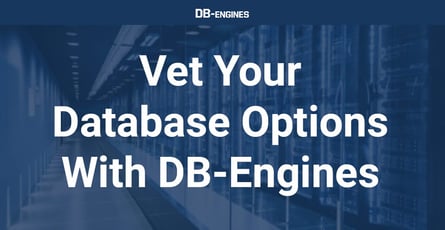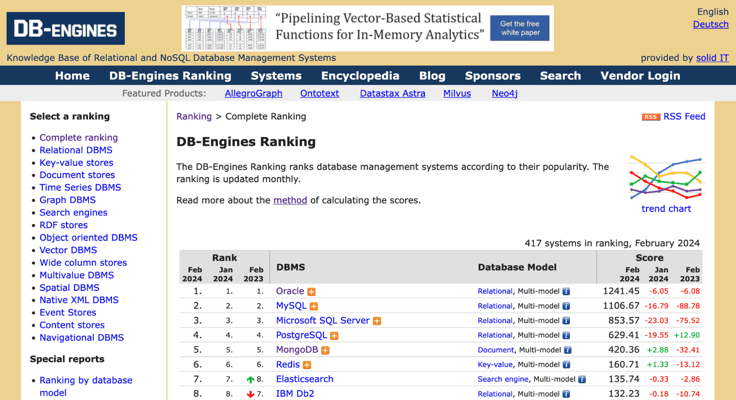
TL; DR: DB-Engines provides an extensive knowledge base of database systems. Its ranking system allows users to learn more about their database options and determine which software will best fit their needs. DB-Engines uses a thorough and detailed method to rank and update its database resource and provides visitors with the information to make well-informed decisions. We spoke with Matthias Gelbmann, Co-Founder of DB-Engines, about the knowledge base, its data sources, and the state of database technology.
The internet has placed everything at our fingertips. Not only can we communicate online, but we can also shop, work, learn, and stream a variety of entertainment outlets via the web. But one of the greatest gifts the World Wide Web has given us is information. Thanks to the internet, we can tap into an endless knowledge reservoir whenever we please.
At any moment, we can pick up our phone, type in a search query, and find an answer to our most pressing questions (or settle a never-ending debate with a friend). The web helps with everyday decisions, even when picking a place to eat. And that brings me to one of my favorite information forms: reviews.
Reviews are a great way to vet a product before purchasing it. They have been a life-changing resource for me, and I always feel confident with my buying decisions because of them. What’s even better is that there are review resources for almost every product category, including database systems.

DB-Engines is a review resource that specializes in database ranking. Its platform is a knowledge base for ranking database systems and tools. Users can find scores, product specifications, and more information on more than 400 databases.
“Our visitors can choose three or four of these databases and compare their differences side by side, not only by the popularity but also by what they can do,” said Matthias Gelbmann, Co-Founder of DB-Engines.
Unbiased Reviews for Various Database Solutions
DB-Engines got its start in 2012. At the time, Matthias and his team were working on a client project and needed to select a complementary database. New NoSQL systems, such as MongoDB, were also making its rise around this time. The team weighed these options but wanted to assess its viability.
“We thought, let’s look at these new databases. Is this something that people actually use? So we made a simple Excel sheet and looked at the query sites and top offerings, including Stack Overflow and Google Trends,” said Matthias.
Establishing these sources for reference helped the DB-Engines team learn more about these systems and their usage. After compiling these data sources into the Excel sheet, Matthias and his team were surprised that some of the new NoSQL systems scored higher than other established systems. They decided to publish their findings, and from there, DB-Engines was born.

“We had great feedback right from the start. People liked it and found it interesting. They started to write and discuss it. Our first ranking had 38 systems, and now we have 417 database systems,” said Matthias.
DB-Engines is now a well-recognized resource within its industry. Its thorough and neutral ranking system allows users to make sound database decisions based on factual information and specifications. DB-Engines also works with providers to list additional key properties of databases.
“Many providers use the service. That’s a win-win for everyone. Having some information from the original source is good for us and our visitors. And it’s good for vendors because they can broadcast their message,” said Matthias.
A Constantly Updated Ranking System
DB-Engines enables visitors to gauge their database options in one place, saving time and streamlining their research and buying process. Users can browse multiple databases, compare them side by side, and make a confident decision that will fit their requirements.
“We have pages where we list the properties of the systems, including what type of APIs it supports, which programming languages, which operating system it supports, which database models, and so on,” said Matthias.
DB-Engines has all the essential details users would need to make a choice. Its ranking system also uses a reliable methodology to rank databases. Its data sources include Google, Bing, Google Trends, Stack Overflow, Indeed, LinkedIn, and X.
DB-Engines uses the following parameters for its rankings:
- number of mentions of the system on websites,
- frequency of searches,
- frequency of technical discussions,
- number of job offers and profiles in professional networks,
- relevance in social networks.
The team continuously updates its database system. Matthias said the team’s innate interest in databases keeps them alert on new trends and other related news. So they are always up to date on new version releases and databases, such as vector databases.
“We are interested in this space. So if something like vector databases comes up, I will study that and make sure I understand what these databases do. We also make sure to keep our ranking sources up to date,” said Matthias.
The Current State of Database Technology
Matthias and his team have worked in the database space for years. They have seen several trends come and go. However, Matthias said one continuous trend is the growth in scope of database systems. Some of the new NoSQL systems initially had much simpler data models, which allowed these simple systems to be more easily distributed across servers.
“So what we see here is that all databases are starting to learn from each other. Providers are learning from each other and picking the best parts from the competitors that still fit into their methodology,” said Matthias.
He said this is a good thing because companies and developers can now consolidate and don’t have to use multiple databases to complete their projects. “That’s what we tell customers when we do some consulting work. If possible, stick with one interface. Databases are getting easier to use because they grow in scope. So that’s one trend we see with the feature set,” said Matthias.
The database industry has also trended toward Software as a Service tools. Matthias said many of the databases on DB-Engines are pure cloud-based solutions, including offerings from Google, Amazon, Microsoft and many smaller providers.
“The move to cloud-based solutions makes sense because they offer big advantages. You have somebody maintaining your stuff and have the scalability, security, and everything that comes with that. And the pure cloud-based systems have moved higher and higher in our ranking,” said Matthias.


